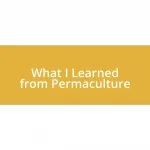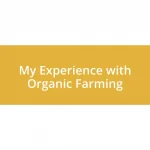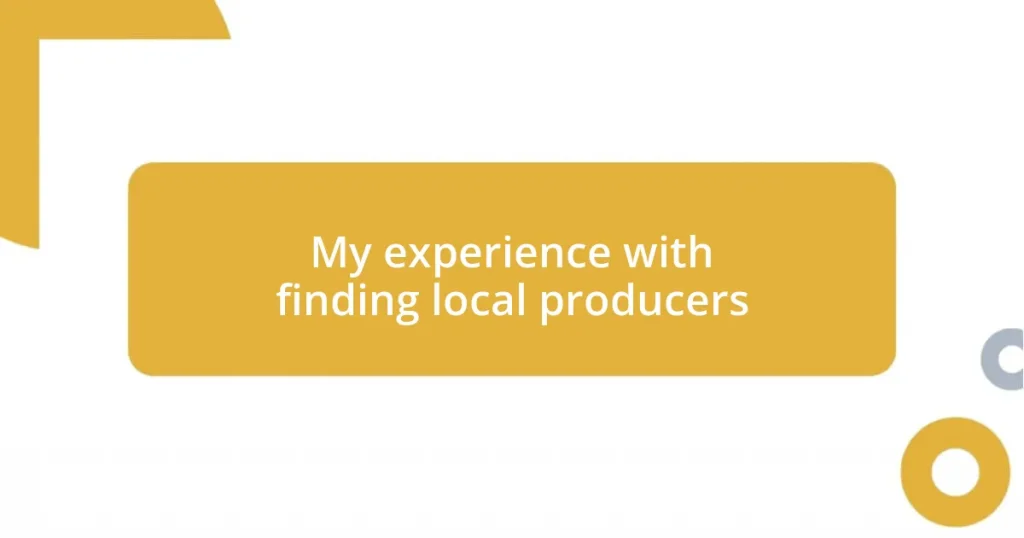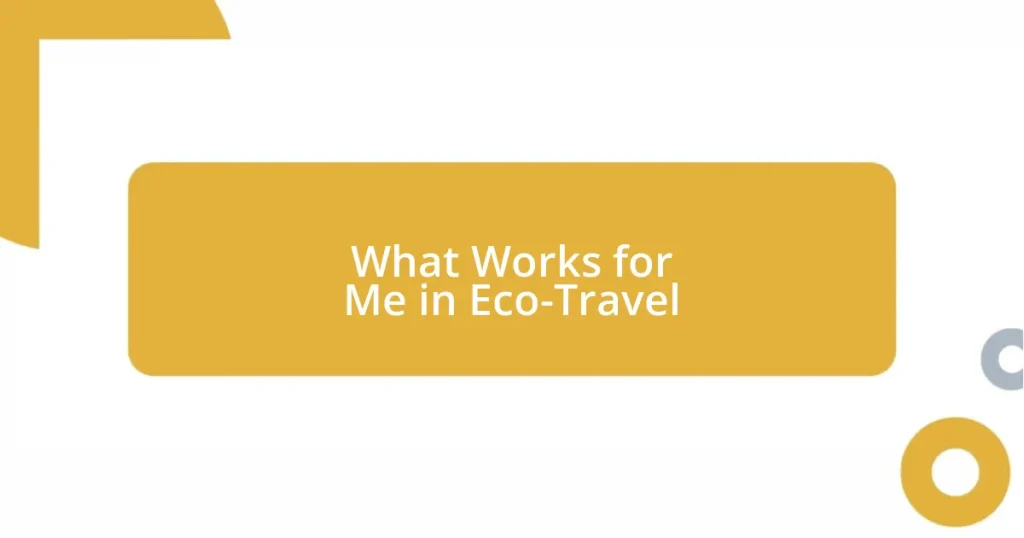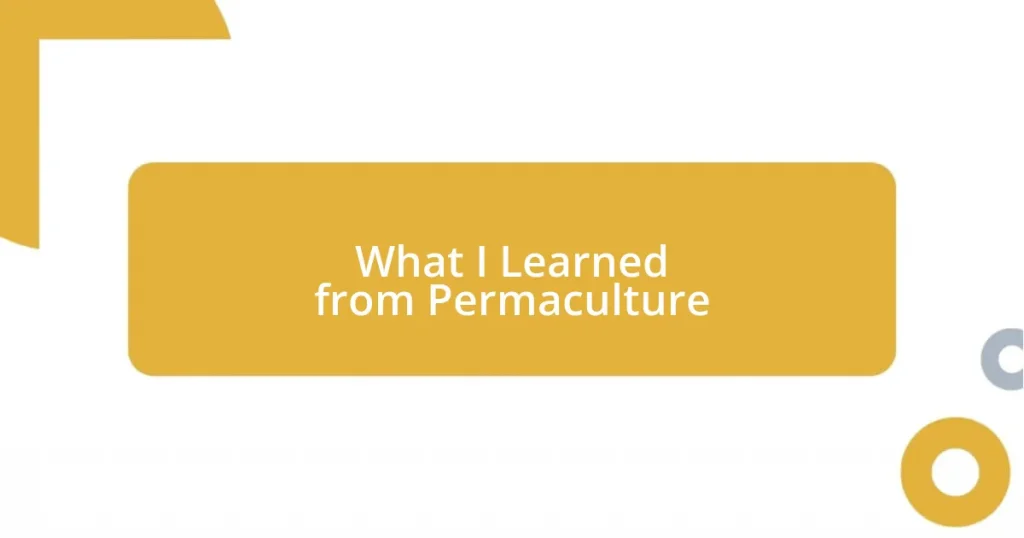Key takeaways:
- Discovering local producers fostered meaningful relationships, enhancing the connection between consumers and the story behind the food.
- Supporting local producers promotes community sustainability, economic growth, and cultural heritage.
- Researching local options involves creativity, utilizing online resources, attending markets, and direct outreach for deeper engagement.
- Sharing experiences with others promotes community involvement and inspires collective support for local food systems.
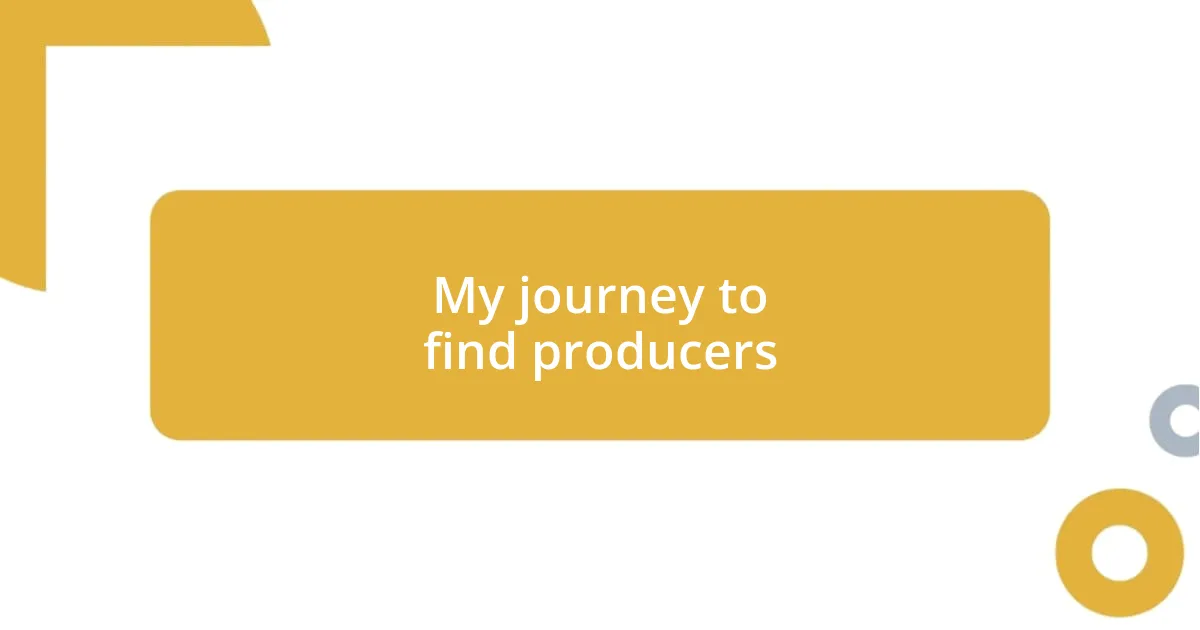
My journey to find producers
Finding local producers was like embarking on a treasure hunt, one that was filled with surprises and discoveries. I remember the first time I stumbled upon a small farm just on the outskirts of town. It was a mere coincidence as I took a wrong turn, but that detour led me to the most vibrant community of farmers I’ve ever met.
As I chatted with them, I felt a genuine connection—a sense of shared values and passion for quality. Have you ever noticed how the conversation changes when you’re talking to someone who truly loves what they do? I could sense their pride in their produce as they recounted their farming practices. It was a moment of realization for me: supporting local wasn’t just about buying food; it was about fostering relationships and understanding the stories behind what we consume.
The more I explored, the more I questioned how my choices impacted these producers’ lives. I found myself seeking out markets, coffee shops, and even social media pages that highlighted local offerings. Each new relationship reinforced my commitment to supporting my community. Was I making a difference? With every purchase and every conversation, I felt that I was contributing to a larger story—one filled with hope, connection, and a shared future.
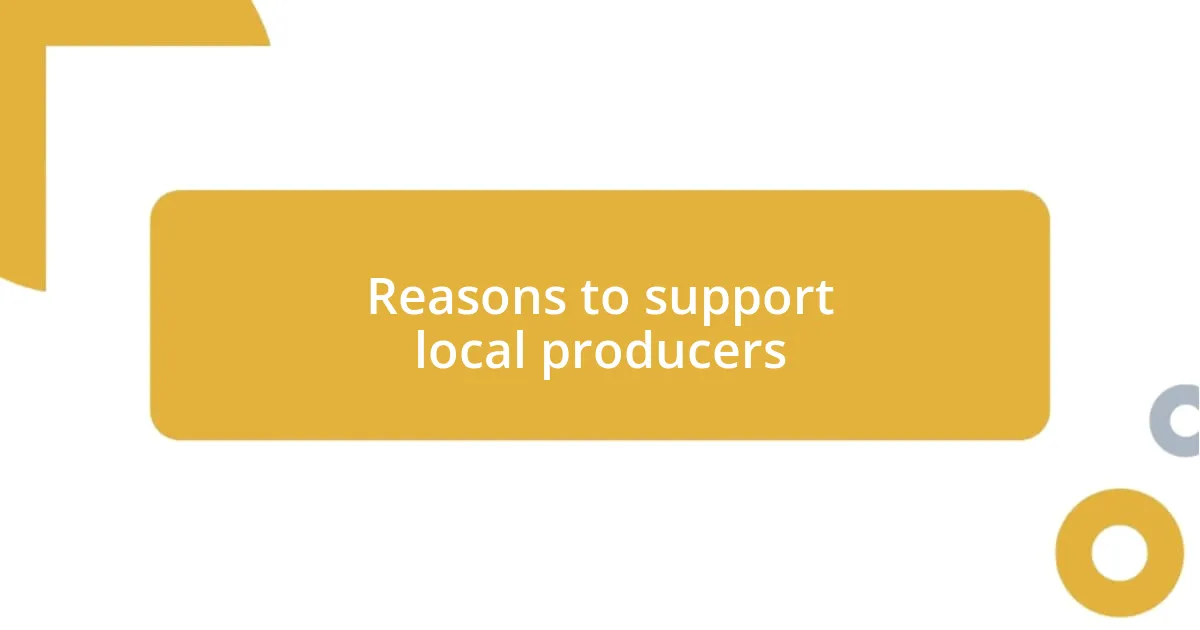
Reasons to support local producers
Supporting local producers goes beyond just purchasing goods; it’s about creating a sense of community and sustainability. I remember the first time I walked into a farmer’s market, overwhelmed by the colors and scents around me. Every stand was a story, a slice of the local landscape captured in jars of jam or bunches of greens. That experience opened my eyes to the immense value that these local offerings bring to our lives—not just nourishing our bodies but also nourishing our community spirit.
Here are some compelling reasons to support local producers:
- Freshness and Quality: Local products often boast peak freshness, packed with flavor, because they go from farm to table in a matter of hours, not days.
- Economic Boost: Purchasing from local producers keeps money circulating within the community, supporting jobs and local businesses.
- Sustainability: Local farming practices can be more environmentally friendly, reducing transportation emissions and promoting biodiversity.
- Cultural Connection: Each local product carries the essence of the region, allowing us to celebrate and savor our local heritage through food.
- Transparent Practices: Building relationships with local producers means you can learn about their farming methods and practices, fostering trust in what you’re consuming.
When I discovered my neighborhood’s local dairy farm, I was delighted to learn they implemented eco-friendly practices and contributed to local charities. Knowing that every yogurt I enjoyed had a positive ripple effect in my community made each scoop taste even richer. Supporting local producers is not just about filling your pantry; it’s about feeling part of something bigger.
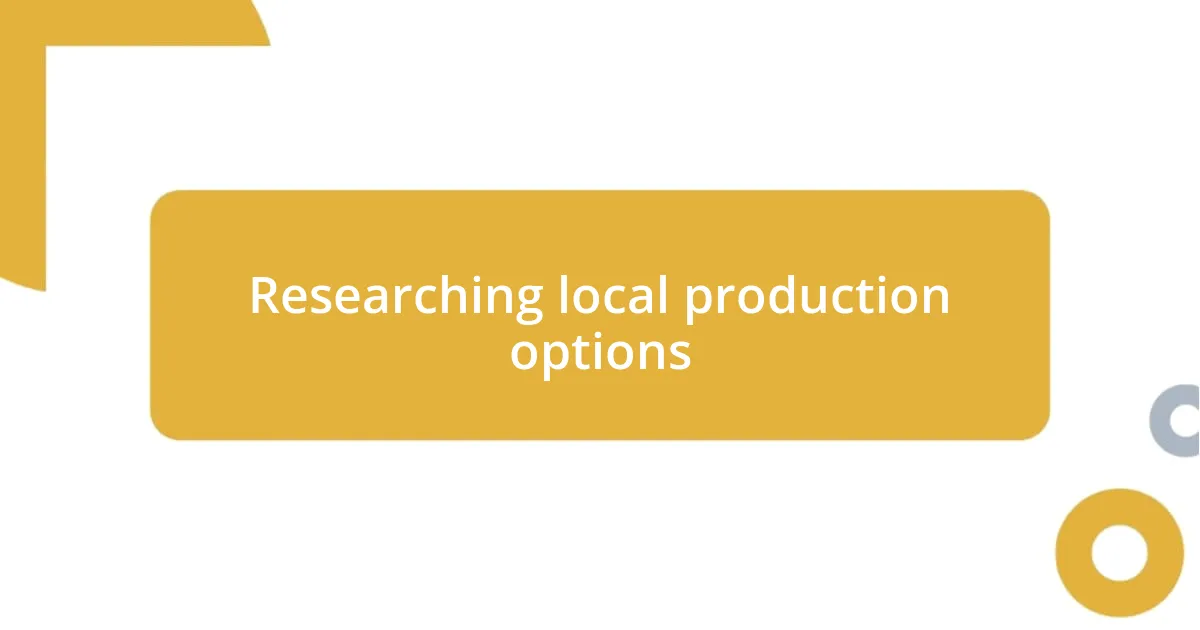
Researching local production options
When it comes to researching local production options, I’ve learned that diving into this exploration requires a bit of creativity and effort. I often started by delving into local directories and community boards. I remember browsing through my town’s Facebook groups and discovering an incredible array of producers. Those digital spaces are teeming with recommendations and personal experiences that can guide you directly to hidden gems in your area.
Another helpful approach I’ve found is visiting local markets or community events. Each weekend, I made it a ritual to attend farmers’ markets. I was often surprised by the enthusiastic conversations I’d strike up with vendors and other customers, all eager to share their favorite spots for local goods. By engaging with these community members, I wasn’t just learning about what to buy—I was steeping myself in the stories and traditions that shaped our local economy.
Lastly, I found that reaching out personally to producers, even through email or social media, turned out to be incredibly rewarding. One memorable afternoon, I sent a message to a local bakery that caught my eye, inquiring about their sourcing practices. To my delight, the owner took the time to share her journey and even invited me to visit her shop. It was experiences like these that made my research feel less like a chore and more like building connections with like-minded individuals.
| Research Method | Experience |
|---|---|
| Online Resources | Browsing community boards can reveal local producers and personal stories. |
| Farmers’ Markets | Engaging with vendors creates connections and encourages conversation about local goods. |
| Direct Outreach | Reaching out to producers fosters relationships and provides deeper insights into their practices. |
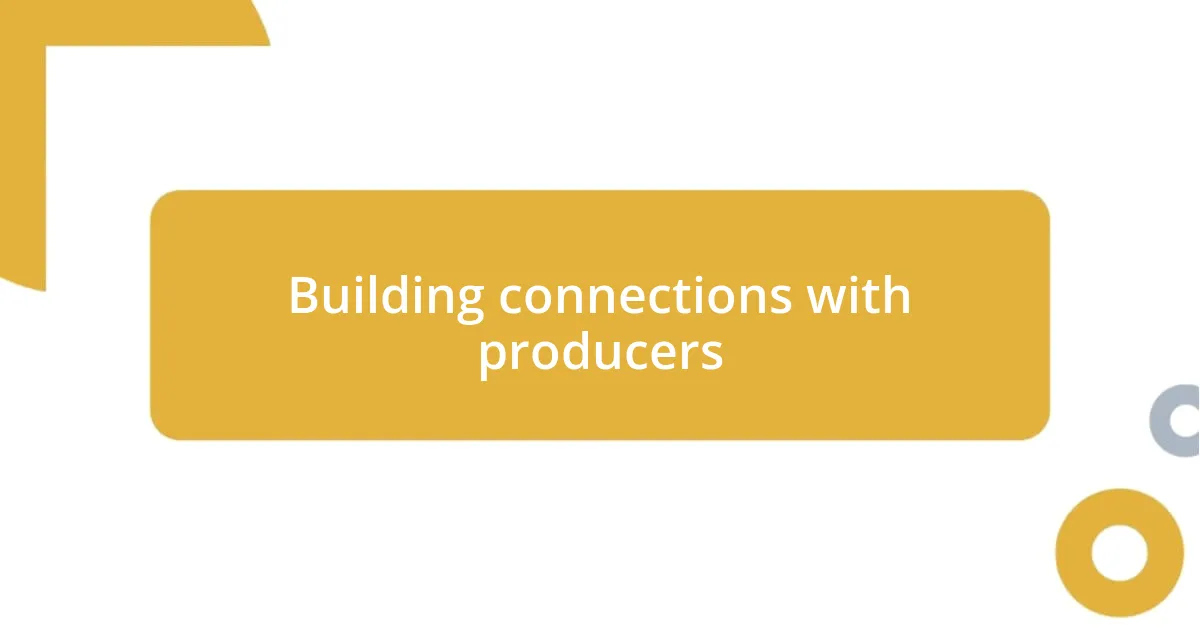
Building connections with producers
Building connections with local producers has transformed the way I approach food shopping. I recall a lovely autumn Saturday when I met a berry farmer at a local market. He shared his passion for organic farming and, as he spoke, I felt a genuine connection not just to the food but to the person behind it. It made me wonder, how often do we think about the hands that nurture our food before it reaches our tables?
As I continued to build these connections, I discovered that every local producer has a unique story to tell. One day, I visited a small cheese shop and ended up spending hours learning about the intricate cheese-making process. The owner, who was so eager to share her knowledge, made me appreciate the art behind something as simple as a cheese wheel. It’s moments like these that remind me how enriching it is to connect with the individuals shaping our food landscape. Have you ever tapped into the stories behind the products you consume?
I’ve seen firsthand how these relationships can lead to meaningful collaborations within the community. By engaging with producers, I began to receive invitations to special events and tastings, which felt like exclusive access to a world I didn’t know existed. Each connection strengthened a sense of belonging, creating a web of community support that invigorates the local economy and enhances my shopping experience. There’s something truly satisfying about knowing you’re not just a consumer, but part of a thriving, interconnected community.
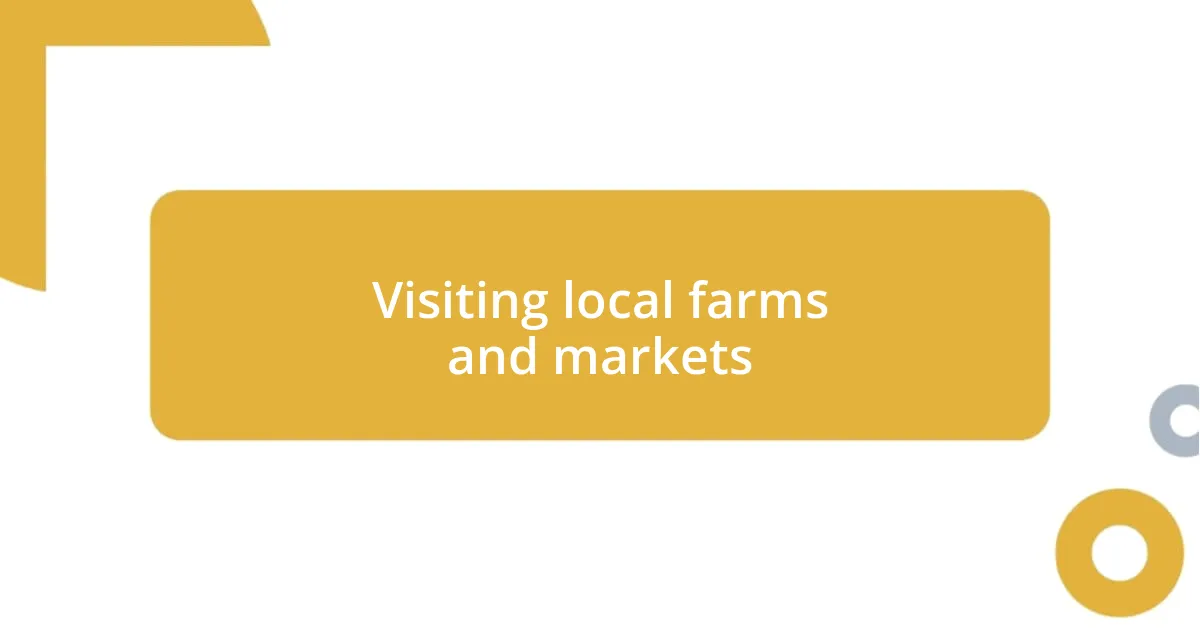
Visiting local farms and markets
Visiting local farms and markets has always felt like a treasure hunt for me. The first time I stepped onto a farm, it was an eye-opening experience. The vibrant colors of fresh produce, the smell of hay, and the laughter of children running around—it was all so invigorating. I still remember the warm welcome I received from a farmer who was proud to show me his greenhouse. What struck me most was how passionate he was about sustainable practices. It really got me thinking about the impact our choices have on the environment.
At farmers’ markets, I’ve shared delightful conversations with a range of producers, from vegetable growers to artisan bakers. One Sunday, a baker’s enthusiasm for her sourdough bread inspired me to try my hand at baking at home. I remember her saying, “Each loaf is a labor of love!” That sentiment resonated deeply with me. How often do we consider the effort behind each bite we take? It was there I realized that every handful of fresh herbs or jar of jam carries the essence of the person who crafted it.
Every visit to these local spaces brings new stories and friendships. I often leave a market not only with bags full of fresh goods but also with personal connections that enrich my understanding of where my food comes from. It’s celebrated moments like these—trading recipes with vendors or receiving unexpected cooking tips—that turn shopping into an experience. Have you ever wondered how a simple trip to the market could expand your culinary repertoire and connect you to your community in ways you never anticipated? Each visit is a reminder of the beauty and creativity surrounding our local food system.
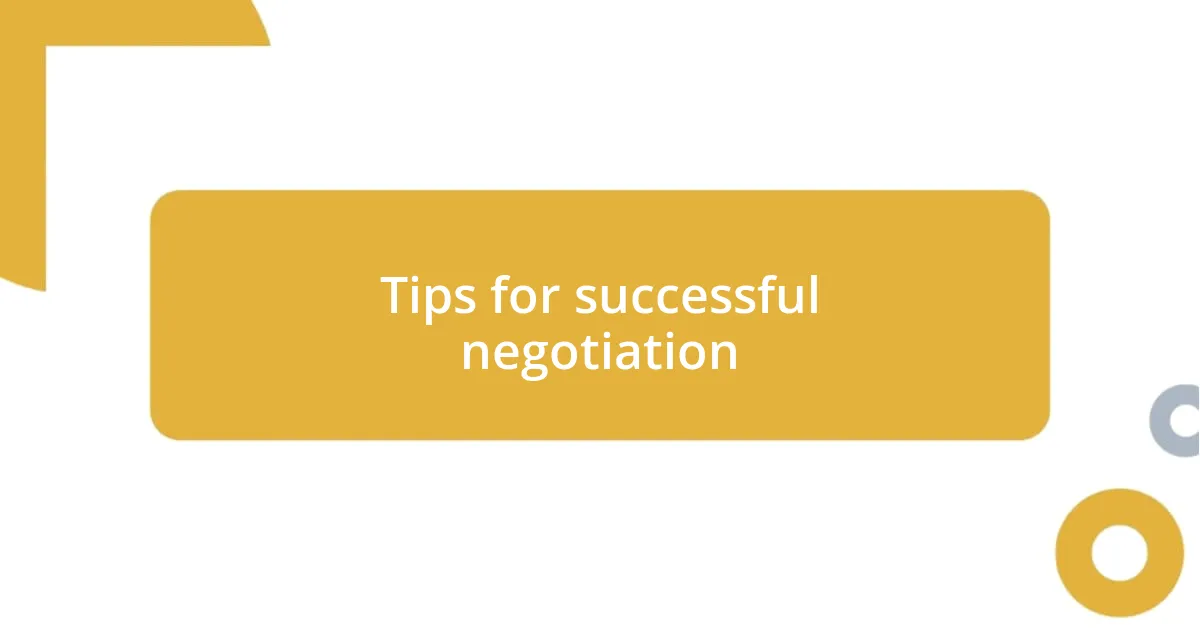
Tips for successful negotiation
Negotiation with local producers can be both exciting and intimidating. From my experience, starting with a genuine compliment or expressing interest in their product can pave the way for a friendly dialogue. I remember negotiating with a honey producer who was initially hesitant to offer a discount. However, when I praised her honey’s unique flavor profile, she smiled and shared a personal story about her beekeeping journey. This connection allowed us to discuss a fair price that worked for both of us.
It’s essential to know what you’re willing to compromise on when negotiating. I learned this during a negotiation with a family-run vegetable farm. By coming prepared with a budget and an understanding of the current market rates, I felt more confident in advocating for the quality and quantity I desired. This level of preparation not only showcased my respect for their work but also helped to establish a mutual understanding. Have you thought about what makes a deal worthwhile for you? Sometimes, learning just that can elevate your negotiation tactics.
Patience plays a crucial role in successful negotiations. I recall a moment with a local wine producer where I was eager to finalize a bulk purchase for a gathering. Instead of rushing the process, I took a deep breath and listened as he shared his insights about the aging process of his wines. That pause led to an enriching conversation, ultimately resulting in a better deal than I had anticipated. Isn’t it fascinating how a little bit of patience can turn a simple transaction into a genuine partnership?
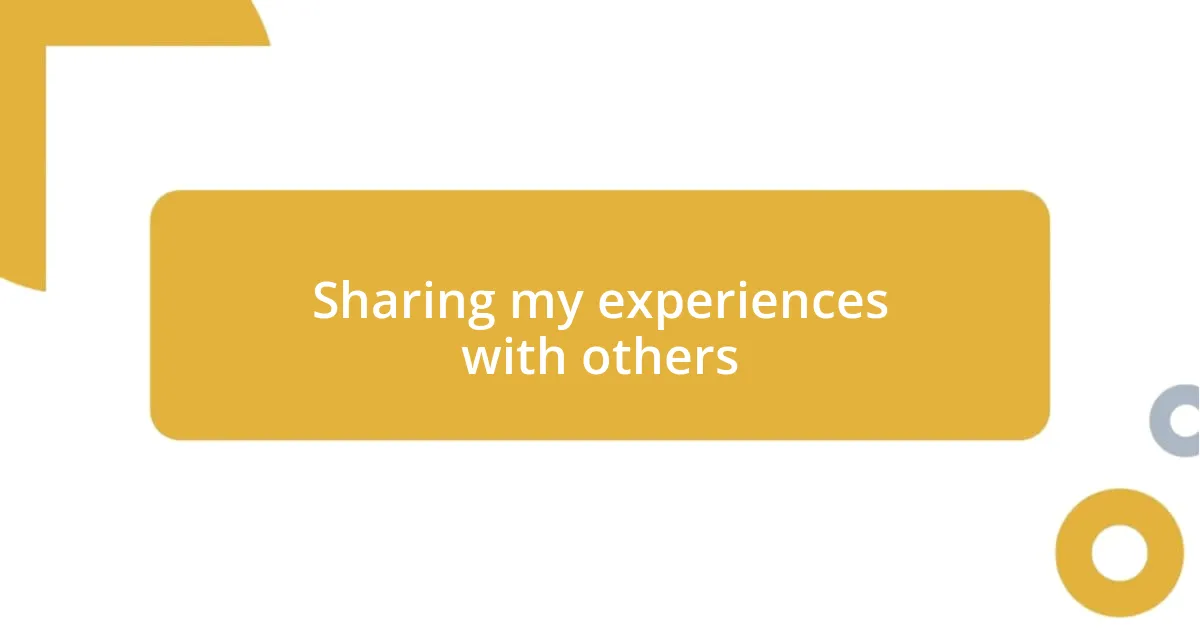
Sharing my experiences with others
Sharing my experiences with others has been one of the most rewarding aspects of my journey with local producers. I remember one evening spent with friends, where I recounted my adventures in selecting organic tomatoes. I could see their eyes light up as I described the farmers’ stories and the passion behind the produce. It prompted a lively discussion about our own food choices and led us to plan a visit to the local market together. Isn’t it amazing how a simple story can inspire others to explore and embrace their community?
Engaging in these conversations often brings unexpected emotions to the surface, too. Recently, after a vibrant discussion about cheese artisans, I noticed a friend whose eyes sparkled with excitement. She shared how she had always wanted to learn about cheese-making but felt intimidated. I encouraged her to reach out to a local cheesemaker I had met, who was more than willing to share her knowledge. It made me realize just how powerful sharing experiences can be—it not only kindles curiosity but also helps foster connections that enrich our lives.
I’ve also found that sharing my experiences can spark a sense of camaraderie within my community. During a local food festival, I bumped into a fellow enthusiast who had heard about my encounters with nearby farmers. We shared insights, swapped tips, and even collaborated on creating a community recipe book. The energy in that exchange was palpable, bringing our passion for local food to life. Don’t you agree that these connections can spark a movement to support local producers? It’s little moments like these that remind me how deeply interconnected we are through our culinary journeys.


